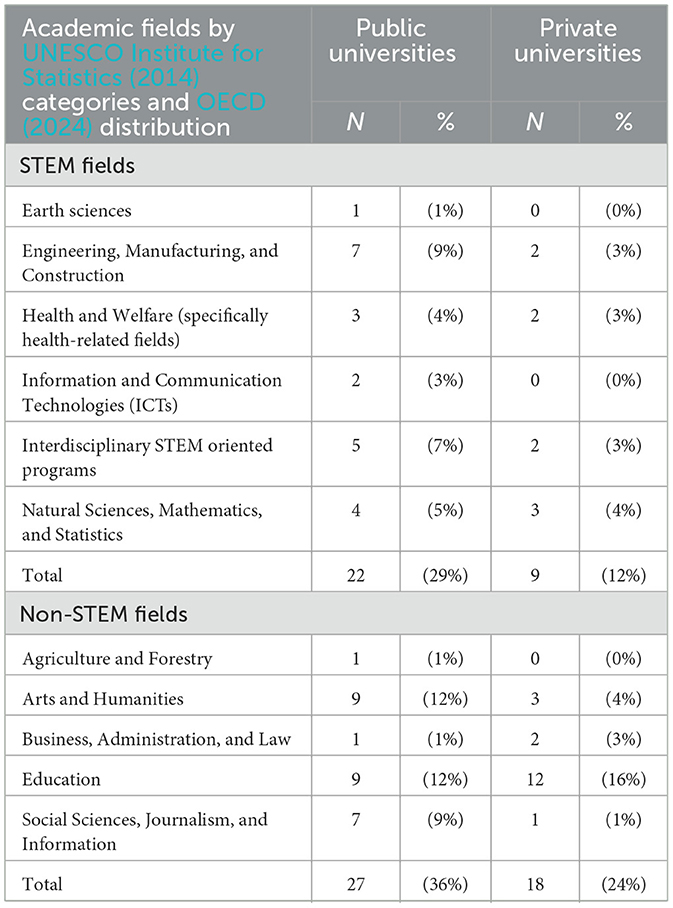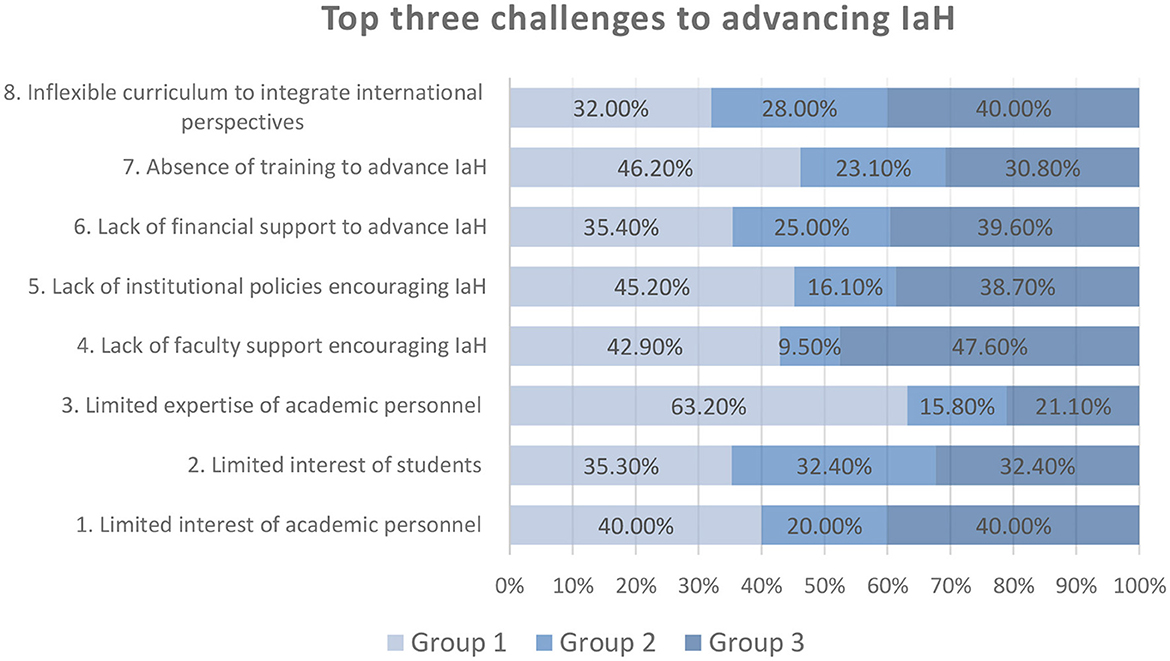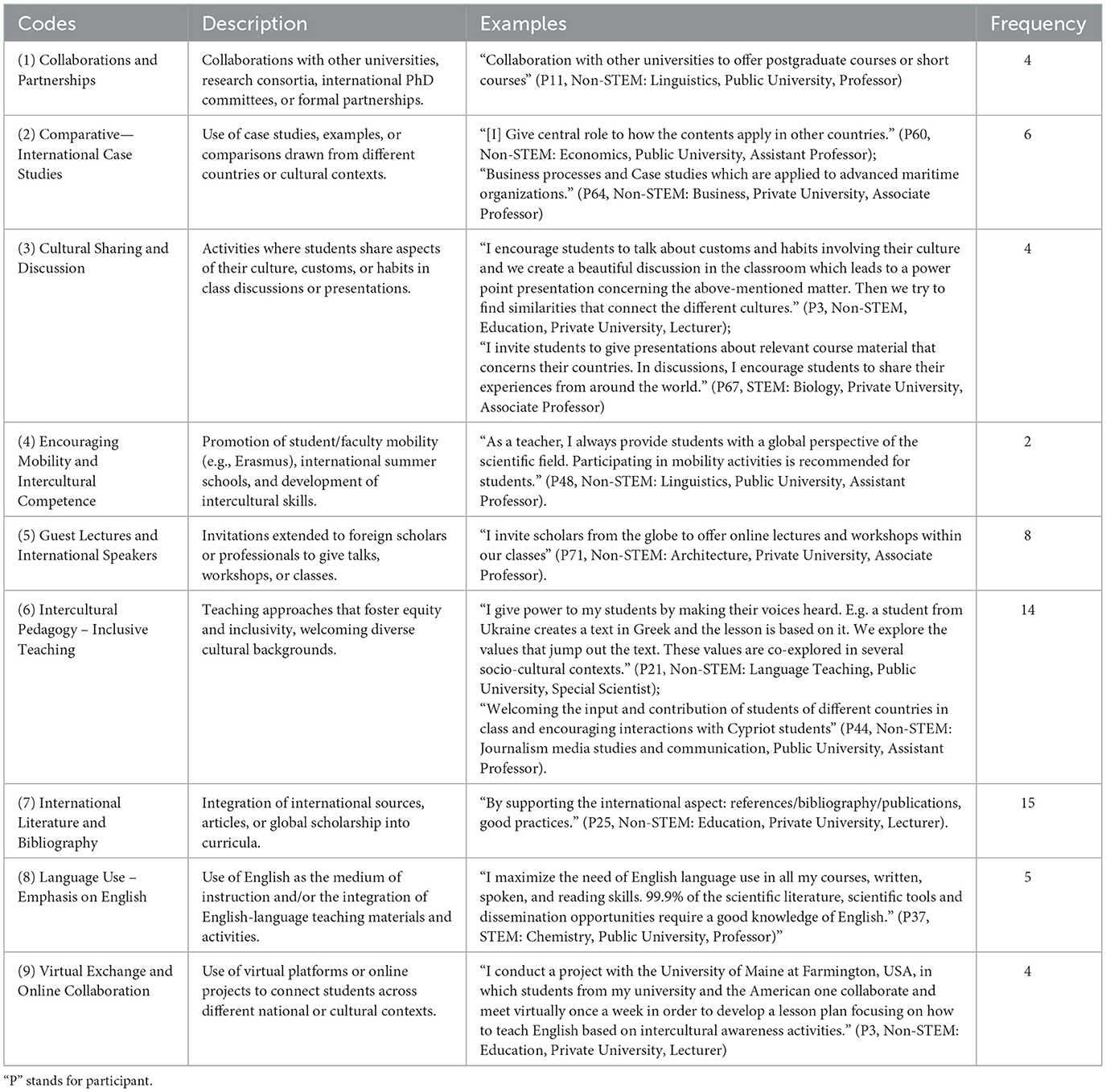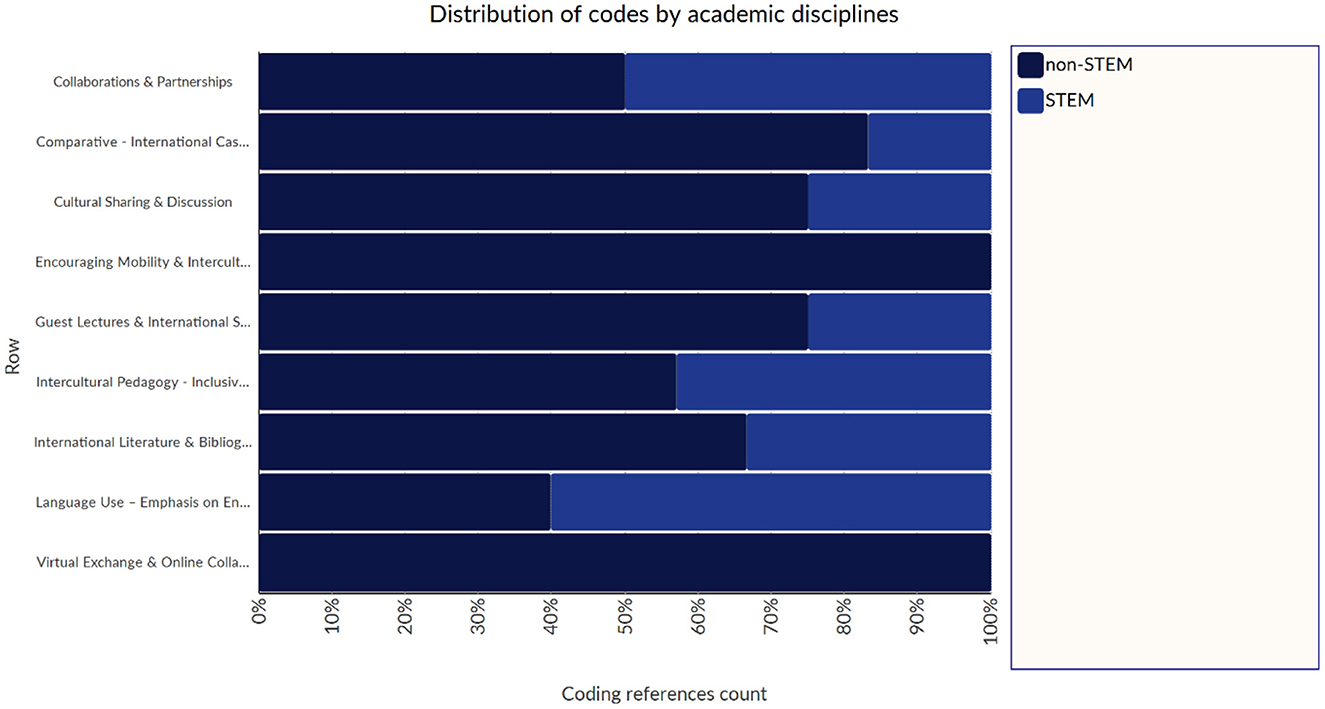- University of Cyprus, Nicosia, Cyprus
This article explores academic staff perceptions and practices of Internationalization at Home (IaH) in the context of higher education in the Republic of Cyprus. Although IaH is increasingly promoted as a strategy for embedding international and intercultural dimensions into the formal and informal curriculum, its implementation varies depending on institutional and academic contexts. This study focuses on three key variables–academic rank, discipline, and institution type–to better understand how institutional and academic contexts shape faculty engagement with IaH. Drawing on data from 76 academic teaching staff across six universities, the study employs both quantitative (three-way ANOVA) and qualitative (Qualitative Content Analysis) approaches, based on insights gathered through a survey. The findings reveal that while most participants integrate some form of IaH into their teaching, notable differences emerge across ranks and disciplines. Senior academics are more likely to implement structurally supported activities, whereas junior staff rely on more accessible, student-centered strategies. STEM faculty tend to equate IaH with English-medium instruction and materials, while non-STEM staff report broader intercultural and pedagogical practices. These findings highlight the need for more context-sensitive approaches to IaH that consider differences in institutional positioning, pedagogical autonomy, and faculty development needs.
1 Introduction
The internationalization of higher education (HE) is increasingly viewed as a key indicator of institutional quality, with mobility being a central component (Knight, 2012; Ogden et al., 2020). Efforts in this area focus on facilitating student and faculty exchanges and establishing bilateral agreements to develop joint program and research collaborations. However, other perspectives challenge traditional frameworks, calling for a more nuanced and comprehensive approach to HE internationalization. de Wit (2024) underscores the need to reassess existing priorities and consider broader implications for its future. He highlights the ongoing debate on what constitutes genuine internationalization, arguing that while mobility remains a dominant aspect, a more critical and inclusive perspective is necessary to capture the full complexity of internationalization in HE.
Internationalization at Home (IaH) has been proposed as an inclusive approach (Janebová and Johnstone, 2022) that broadens the scope beyond physical mobility, emphasizing the integration of international and intercultural dimensions into curricula (Leask, 2015), pedagogy (Lomer and Anthony-Okeke, 2019), campus activities (Jones, 2017; Hofmeyr, 2021), as well as Virtual Exchange which has been recognized as “a powerful instrument and catalyst in advancing efforts to internationalize home curricula” (O'Dowd and Beelen, 2021). Since its inception as a concept in 1998, IaH has aimed to ensure all university students engage with an international dimension in their studies (Nilsson, 2003). While efforts to define IaH continue (Beelen and Jones, 2015; Li and Xue, 2022), institutional recognition remains uneven. Moreover, awareness and implementation of IaH vary widely. Comparative studies (Almeida et al., 2018; Robson et al., 2018; Sierra-Huedo et al., 2024) highlight differences in how institutions integrate international, intercultural, and global dimensions, with inconsistent prioritization of internationalized curricula, intercultural pedagogies, and staff training specifically related to IaH.
Several factors can either enhance or hinder the implementation of IaH practices. One such factor is collaboration and partnerships with local and international stakeholders, which introduce diverse perspectives and create new opportunities (Cunningham et al., 2024). Another critical element is faculty engagement and training, since educators shape internationalized curricula and significantly influence student experiences (Li and Xue, 2023), including fostering their international competencies through domestic collaborations and language education (Plews, 2007). Moreover, institutional characteristics such as academic discipline (Eftekhari et al., 2025), type of institution (Kreber, 2009; Chanda and Betai, 2022; Svetlik and Braček Lalić, 2014; Tamrat, 2020), and academic rank (Childress, 2018; Stohl, 2007) also influence the degree to which IaH is prioritized and implemented. Although these factors have been examined in various contexts, their impact within Cypriot HE remains underexplored. To address this gap, the present study investigates academic staff perceptions of IaH in Cyprus, focusing on how institutional and academic dimensions shape its integration.
2 Academic staff perspectives on the significance and challenges of IaH
The growing importance of IaH was already recognized a decade ago in Beelen and Jones's (2015) review and redefinition of the concept. Since then, its relevance to broader efforts in HE, particularly within the framework of comprehensive internationalization, which emphasizes the systematic integration of international dimensions across institutional operations, including faculty engagement, has been widely discussed (Hudzik, 2015; Janebová and Johnstone, 2022). This increasing attention is also reflected in the recent rise of systematic reviews that explore IaH practices from various perspectives (Eftekhari et al., 2025; Mittelmeier et al., 2024; Soulé et al., 2024), highlighting not only its benefits—such as the development of intercultural sensitivity, collaboration, and digital literacy—but also its challenges, including intercultural, pedagogical, and language-related barriers to implementation.
Despite the growing interest in IaH, little is known from the perspective of academic teaching staff who are not specialists in the field. Two studies stand out as exceptions. The first, conducted in Finland by Weimer et al. (2019), offers relevant insights into academic staff perceptions. The study found that only about half of the academic staff surveyed in the country (n = 764) regarded IaH as important. Furthermore, limited interest in IaH among academic personnel themselves (41%) was also highlighted as a significant obstacle. As the authors note, for individuals unfamiliar with what IaH entails, it is often mistakenly reduced to the mere presence of an international community and English-language offerings. These findings point to fragmented understandings of IaH and limited engagement among academic staff, which may hinder more systematic implementation.
The second study offering insights into academic staff perceptions and institutional engagement with IaH is the 6th IAU Global Survey by Marinoni and Pina Cardona (2024), which examines the internationalization of teaching and learning, including curriculum internationalization at home. Based on responses from 722 HE institutions across 110 countries and territories, the report highlights a significant shift in institutional priorities: 75% of institutions reported an increased emphasis on internationalizing the curriculum. Virtual exchanges—treated separately from COIL and online collaboration in the report, though conceptually similar (O'Dowd, 2023)—have gained prominence. However, these developments have also presented challenges for academic staff, particularly in adapting to new teaching methods associated with online and virtual internationalization. The report also notes that institutional type influences practice. While public and private HE institutions show similar overall engagement, private institutions are more likely to offer online degree programs and Virtual Exchange, and to adopt a wider range of practices such as integrating intercultural dimensions into learning outcomes, leveraging international staff and students, and investing in faculty development. These findings reinforce that effective IaH implementation depends not only on institutional strategy but also on faculty engagement and targeted professional support.
3 Institutional and academic dimensions of integrating IaH practices
The development of IaH in recent decades has also been characterized by its increasing integration across academic disciplines. This integration has occurred both within individual academic fields and through interdisciplinary initiatives. Examples of such interdisciplinary combinations include: (1) Language Studies, Information and Communications Technology, and Tourism Management; (2) Dental Technology and Business Management; (3) Global Nutrition and Culinary Arts; (4) Human Biology, Biochemistry, and Public Health; and (5) Engineering, Management, Economics, Mechatronics, and Robotics (Soulé et al., 2024).
This breadth of integration has been facilitated by the diverse modalities encompassed within IaH, notably in-campus cultural diversity, particularly in multicultural classrooms with significant international student populations (Barbosa et al., 2020), and Virtual Exchange (O'Dowd, 2023). The prominence of Virtual Exchange in these initiatives reflects the ongoing trend toward the digitalization of education. For example, (Helm and Beaven 2020) document case studies from a range of underrepresented disciplines, including tourism, performing arts, history, and STEM, alongside more commonly featured areas such as language and culture, and business. Another important finding regarding the integration of IaH practices is that their implementation varies across disciplines. Eftekhari et al. (2025) observed these differences in fields such as biology, business, engineering, law, mathematics, medicine, music, nursing, and psychology. Moreover, the authors noted that key components of IaH practices through an internationalized curriculum, such as intended learning outcomes and assessment practices, are rarely reported and therefore remain underexplored in all of these areas.
IaH practices do not occur in a vacuum; rather, they are shaped by both internationalization rationales and the broader institutional environment, with institutional type also being an influential factor (Marinoni and Pina Cardona, 2024). For instance, (Kreber 2009) emphasizes the importance of advancing internationalization in teaching and identifies several underlying rationales. One such rationale is economic, often seen as a response to market forces stemming from the economic dimension of globalization, a view that is echoed by Pop et al. (2024), who note a growing perception that internationalization efforts are increasingly driven by economic motivations. Some studies argue that these rationales often manifest differently depending on whether the institution is public or private. For Chanda and Betai (2022) private HE institutions tend to adopt internationalization strategies, including IaH, with a stronger focus on employability, market responsiveness, and global competitiveness. These strategies may influence aspects such as curriculum design, pedagogic practices, and skill development. However, private HE institutions may also face distinct regulatory and structural challenges that affect the scope and effectiveness of their IaH initiatives (Tamrat, 2020). In contrast, public institutions may be more inclined toward cultural, academic, or political rationales for internationalization, depending on their mission and funding structures (Svetlik and Braček Lalić, 2014).
A less explored, yet equally important, factor in the implementation of IaH is academic rank. While institutional type and disciplinary context have received considerable attention, the influence of academic rank on faculty engagement with IaH practices remains relatively under-researched. As Stohl (2007) argues, a central challenge for advancing internationalization lies in effectively engaging faculty members. He emphasizes the importance of addressing institutional reward structures and academic cultures to foster sustained faculty commitment to internationalization efforts, including IaH. More recently, Childress (2018) has shown that while senior leaders frequently advocate for internationalization to prepare students for a globalized world, such efforts often fall short due to limited faculty engagement. Her work identifies concrete strategies that successful institutions have employed to overcome internal barriers, including the “5 I's” model (intentionality, investments, infrastructure, institutional networks, and individual support) as a framework for embedding faculty engagement in internationalization across teaching, research, and service.
4 National policy and legislative framework shaping IaH in the Republic of Cyprus
Understanding IaH in Cyprus requires situating it within the national policy and regulatory framework governing HE. The Ministry of Education, Sport and Youth oversees both public and private HE institutions, aiming to position Cyprus as a regional educational and research hub under the auspices of the European Higher Education Area (EHEA) and the Bologna Process (Ministry of Education, Sport and Youth, 2024). The development of HE in Cyprus has also been strongly influenced by European integration processes and international evaluations. As Klerides and Philippou (2015) note, the educational reforms of 2004–2014 were shaped by the Bologna Process, the Treaty of Nice, and international assessments such as PISA, which have pushed Cyprus toward adopting western models of governance and quality assurance. These historical and international influences underpin the current legislative and policy framework within which internationalization practices are situated.
A key legal milestone was the enactment of Law 136(I)/2015, which established the Cyprus Agency of Quality Assurance and Accreditation in Higher Education as the central authority for external evaluation and accreditation across all HE institutions (CYQAA, 2015). As Emilianides and Hadjisoteriou (2020) highlight, education policy in Cyprus is deeply rooted in constitutional principles and international conventions, which guide the development of quality assurance mechanisms and regulatory policies affecting both public and private universities. Under this legislation, both public and private universities are legally mandated to undergo institutional, departmental, and programmatic accreditation in compliance with the European Standards and Guidelines (ENQA, 2018). This framework consolidated previously fragmented quality assurance practices into a single national system, ensuring alignment with European benchmarks (Eurydice, 2025).
Despite a strategic push for internationalization, national policy continues to emphasize student mobility and institutional branding, with little explicit mention of IaH (European Commission, Directorate General for Education, Youth, Sport and Culture, 2024). Moreover, public universities are legally restricted from offering undergraduate instruction in English, which limits the implementation of some type of IaH practices. In contrast, private universities, operating under a more flexible legislative framework, frequently deliver English-medium programs (AACRAO, 2024; Philenews, 2025). Hence, within this policy and institutional landscape, it is unsurprising that the implementation of IaH teaching and learning practices in Cyprus has been documented in only a limited number of studies. These efforts have been identified in both public and private universities, and academic rank does not appear to be a determining factor in their dissemination. However, the available examples are limited to two disciplines: language learning (Nicolaou and Sevilla-Pavón, 2016; Sevilla-Pavón and Nicolaou, 2020) and Occupational Therapy (Psychouli et al., 2020). A shared characteristic of these studies is their exclusive focus on a single IaH modality: Virtual Exchange. Given the limited body of published research in the Cypriot HE context, the present study was undertaken to investigate IaH practices that may be implemented by academic staff but remain undocumented in the existing literature.
5 Methods
This study aims to investigate academic staff perceptions of IaH in Cypriot HE, focusing on the influence of academic discipline, institutional type, and academic rank. Additionally, it examines the extent to which academic staff in the Republic of Cyprus engage in IaH activities and their implementation practices. The study is guided by two research questions (RQ):
RQ1: To what extent do academic discipline, institution type, and academic rank influence academic staff perceptions of IaH in Cypriot HE, particularly in terms of its perceived importance, departmental priority, challenges and implementation?
RQ2: What activities, if any, do academic staff implement to promote IaH practices in their classes, and how do these activities vary according to their academic discipline, type of institution, and academic rank?
5.1 Instruments
The main instrument for data collection in this study was a modified version of the 6th Global Survey Report by the International Association of Universities (Marinoni and Pina Cardona, 2024). The modification incorporated elements from Weimer et al.'s (2019) survey on IaH. Both the Marinoni and Pina Cardona (2024) survey and that of Weimer et al. (2019) have been validated and found reliable for examining academic staff perceptions of IaH. Our survey was structured into three sections: a consent form, a participant profile, and an IaH section, comprising both closed- and open-ended questions. As part of a larger study, the survey was conducted under a methodology approved by the Cyprus National Bioethics Committee. This study reports on a specific subset of the survey results, focusing on the perceived importance of IaH, the priority assigned to it within academic staff's departments, the challenges to advancing IaH, and its implementation in class. The survey was administered online.
5.2 Survey distribution
The online survey was sent to all accredited universities founded in the Republic of Cyprus, with voluntary participation open to all academic staff, regardless of discipline, department, or academic rank. Responses were received from six universities (three public and three private), reflecting the institutions where academic staff chose to participate. Subsequently, a desk-based search of publicly available documents on internationalization activities and strategic initiatives was conducted on the websites of the six universities. The three public institutions (U1, U2, and U3)1 showed similar levels of documentation (44, 44, and 36 documents), whereas the private universities varied considerably, with U4 providing 143 documents, U6 108, and U5 only 25. These documents were further examined with a focus on keywords related to internationalization practices and on the terminology used by the institutions to describe these activities. The analysis was guided by the frameworks and conceptual approaches proposed by Ferencz and Rumbley (2022) and Seeber et al. (2020). Table 1 displays the frequency and distribution of the terminology identified across the documents.
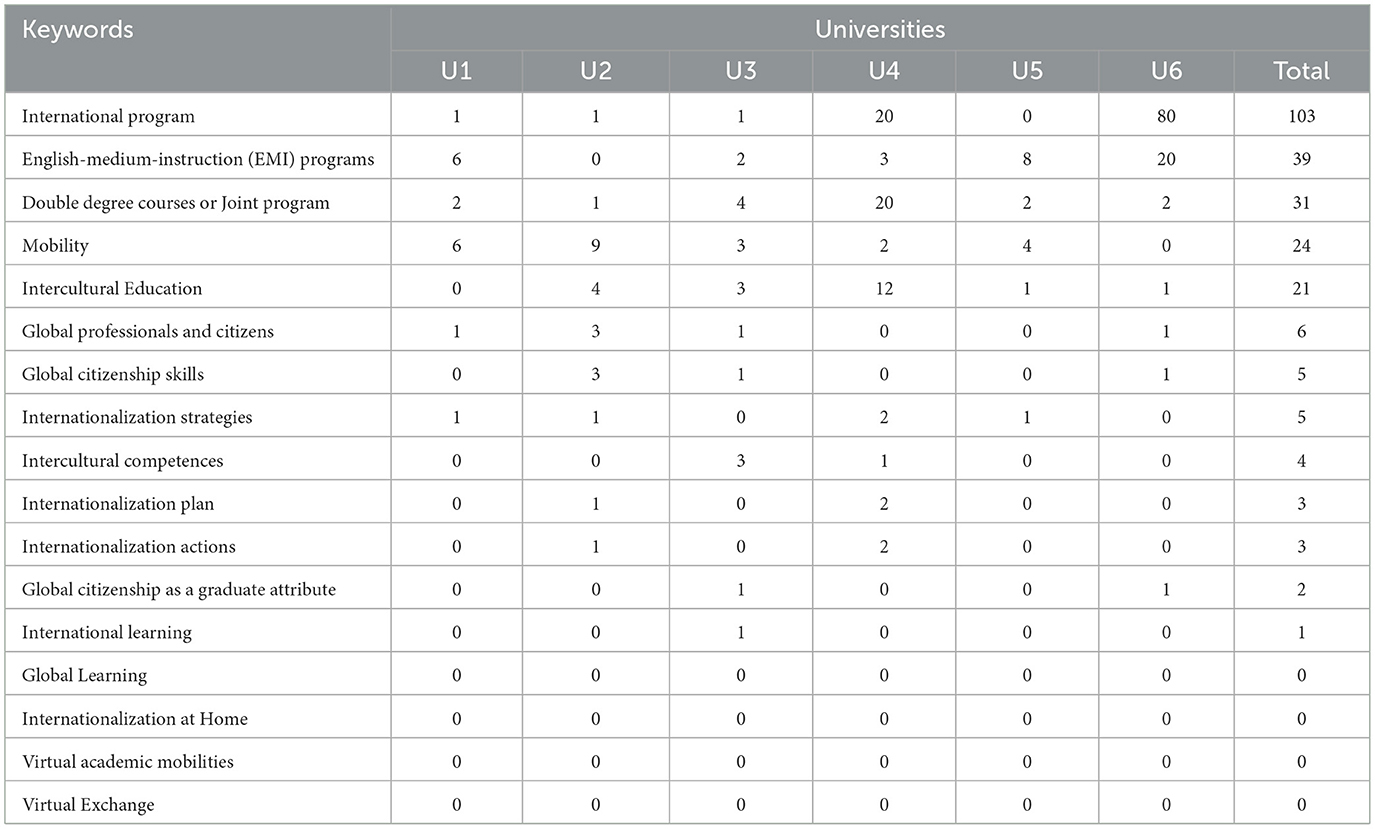
Table 1. Key terms and concepts of internationalization in publicly available documents from the six universities in Cyprus employing the study's participants.
Table 1 shows an uneven distribution of internationalization terminology. International program are most frequently referenced (103 instances), followed by EMI program (39) and Double degree courses or Joint program (31), underscoring their importance in institutional strategies. Intercultural education appears 21 times. Interestingly, neither IaH nor Virtual mobility are referenced explicitly, raising questions about how these six institutions ensure international learning opportunities for all students.
5.3 Participants
Seventy-six academic teaching staff from six universities in the Republic of Cyprus participated in the study with 42.1% male (n = 32) and 57.9% female (n = 44). Their mean age at the time of data collection was 45.7 years. Most held a doctorate (88.2%, n = 67), with 11.8% (n = 9) holding a master's degree. Participants were classified by academic rank into three groups2: Group 1 (20 Special Scientists, 11 Special Teaching Staff); Group 2 (6 Lecturers, 11 Assistant Professors); and Group 3 (14 Associate Professors, 14 Professors).
The academic staff represented a diverse range of 23 disciplines: Education was the most represented category, with 14.5% (n = 11) in general Education, and 13.2% (n = 10) in Language Teaching. Linguistics, and Engineering and Technology each accounted for 10.5% (n = 8), while Interdisciplinary STEM oriented programs comprised 9.2% (n = 7). Social Sciences included Journalism, Media Studies, and Communication (3.9%, n = 3) and Psychology (6.6%, n = 5). Contributions from Natural Sciences were led by Chemistry (5.3%, n = 4), followed by Biology (2.6%, n = 2) and Mathematics (1.3%, n = 1). Other fields such as Arts and Humanities included History (2.6%, n = 2), Archaeology and Arts (each 1.3%, n = 1). Other contributions were noted in Business (2.6%, n = 2), Law (1.3%, n = 1), Environmental Studies and Forestry (1.3%, n = 1), Architecture (1.3%, n = 1), Earth Sciences (1.3%, n = 1), and Health fields, including Global Health (1.3%, n = 1), Medicine (2.6%, n = 2), and Nursing (2.6%, n = 2). Computer Sciences also contributed 2.6% (n = 2).
The participants disciplines were classified according to the ISCED-F 2013 categories (UNESCO Institute for Statistics, 2014). These disciplines were further grouped into two overarching categories, STEM and non-STEM fields, following the approach of prior studies (OECD, 2024) that analyze differences between these domains in educational contexts according to the UNESCO Institute for Statistics's (2014) classification. Table 2 presents the distribution of participants by academic discipline and institution type.
5.4 Data analysis
Three-way ANOVAs were conducted on the quantitative data of the survey to examine the results for four key areas: the Importance of IaH, the Priority of IaH for the Department, Challenges to Advancing IaH, and the Implementation of IaH Practices. The analyses explored the effects of three independent variables: academic discipline (STEM vs. non-STEM), institution type (public vs. private), and academic rank (Groups 1–3, as previously defined). Statistical analyses were performed using SPSS (version 25), with significance levels set at p < 0.05. Qualitative data, collected through open-ended questions, were analyzed using Qualitative Content Analysis (QCA), following an inductive, data-driven approach (Selvi, 2020). First- and second-level coding were employed to reduce the data into groups of categories. These categories then formed the basis for quantitative analyses, primarily involving frequencies and percentages. NVivo Release 1.0 (Jackson and Bazeley, 2019), was employed to support the coding process.
6 Results
6.1 Academic staff perceptions on the implementation of IaH practices
The first research question examined the extent to which academic discipline (STEM, n = 31; non-STEM, n = 45), type of institution (public, n = 49; private, n = 27), and academic rank (G1: Special Teaching Staff or Special Scientist, n = 31; G2: Assistant Professor or Lecturer, n = 17; G3: Professor or Associate Professor, n = 28) influence academic staff perceptions regarding the implementation of IaH practices in Cypriot HE. Specifically, this question explored how academic staff view the importance of IaH in their departments, whether IaH is considered a strategic priority, the key challenges associated with advancing it, and whether they implement IaH in their classes.
6.1.1 Academic staff perceptions of the importance of IaH in their departments
Descriptive statistics analysis of academic staff perceptions toward the importance of IaH in their departments are presented in Table 3.
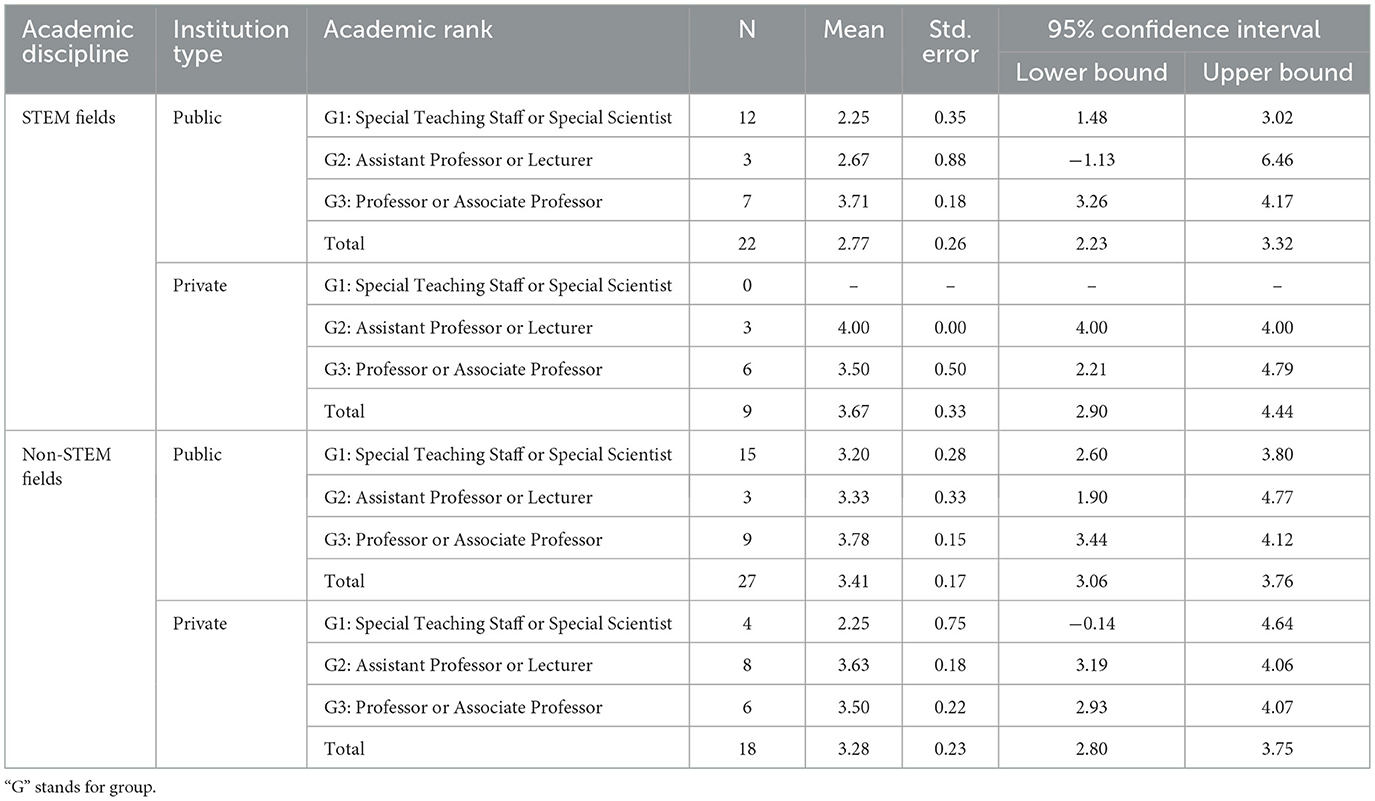
Table 3. Descriptive statistics for the academic staff perceptions of the importance of IaH in their departments between academic discipline, institution type and academic rank categories.
Overall, Table 3 indicates that participants from private institutions reported higher mean scores, suggesting stronger agreement with the importance of IaH. In private STEM fields, Group 2 consistently rated IaH highly (M = 4.00), while group 3 scored slightly lower (M = 3.50). Conversely, in public STEM fields, Group 3 reported the highest agreement (M = 3.71), while Group 1 expressed more ambivalence (M = 2.25). In non-STEM fields, public institutions showed consistently positive responses, particularly among Group 3 (M = 3.78). Private non-STEM responses varied, with Group 2 showing the highest agreement (M = 3.63), while Group 1 exhibited more neutral perceptions (M = 2.25).
The results of a three-way ANOVA indicated a significant main effect of the academic rank on the academic staff perceptions toward the importance of IaH in their departments, F(2, 65) = 6.418, p < 0.01, =0.17 (Figure 1). Pairwise comparisons revealed that the mean academic staff perceptions of the importance of IaH in their departments was significantly lower for Group 1 than both Group 2 (p < 0.05) and Group 3 (p < 0.001). The mean academic staff perceptions of the importance of IaH in their departments was not significantly different between Groups 2 and 3 (p = 0.488). Academic discipline had no significant effect on academic staff perceptions of IaH importance, F(1, 65) = 1.094, p = 0.299, = 0.02, with no difference between STEM and non-STEM fields. Institution type also showed no significant effect, F(1, 65) = 0.002, p = 0.962, = 0.00, with perceptions similar across public and private institutions.
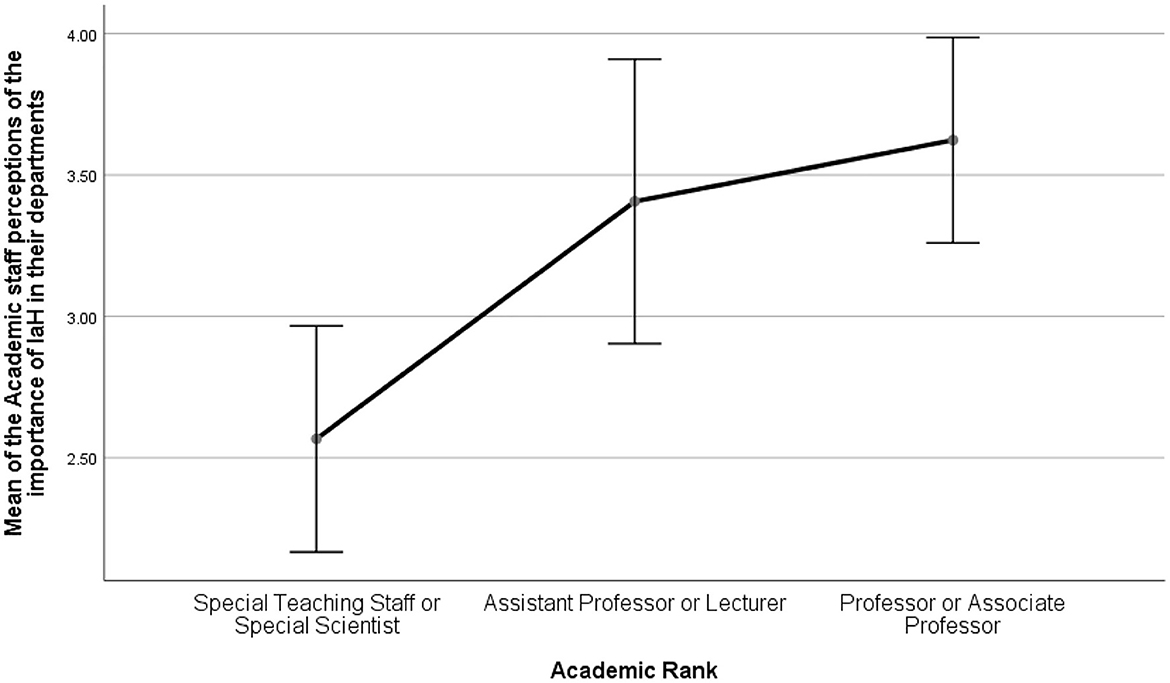
Figure 1. Mean plots with 95% confidence intervals error bars of the academic staff perceptions of the importance of IaH in their departments between academic rank categories.
6.1.2 Academic staff perceptions of IaH as a strategic priority in their departments
Descriptive statistics on academic staff perceptions of IaH as a strategic priority in their departments are summarized in Table 4.
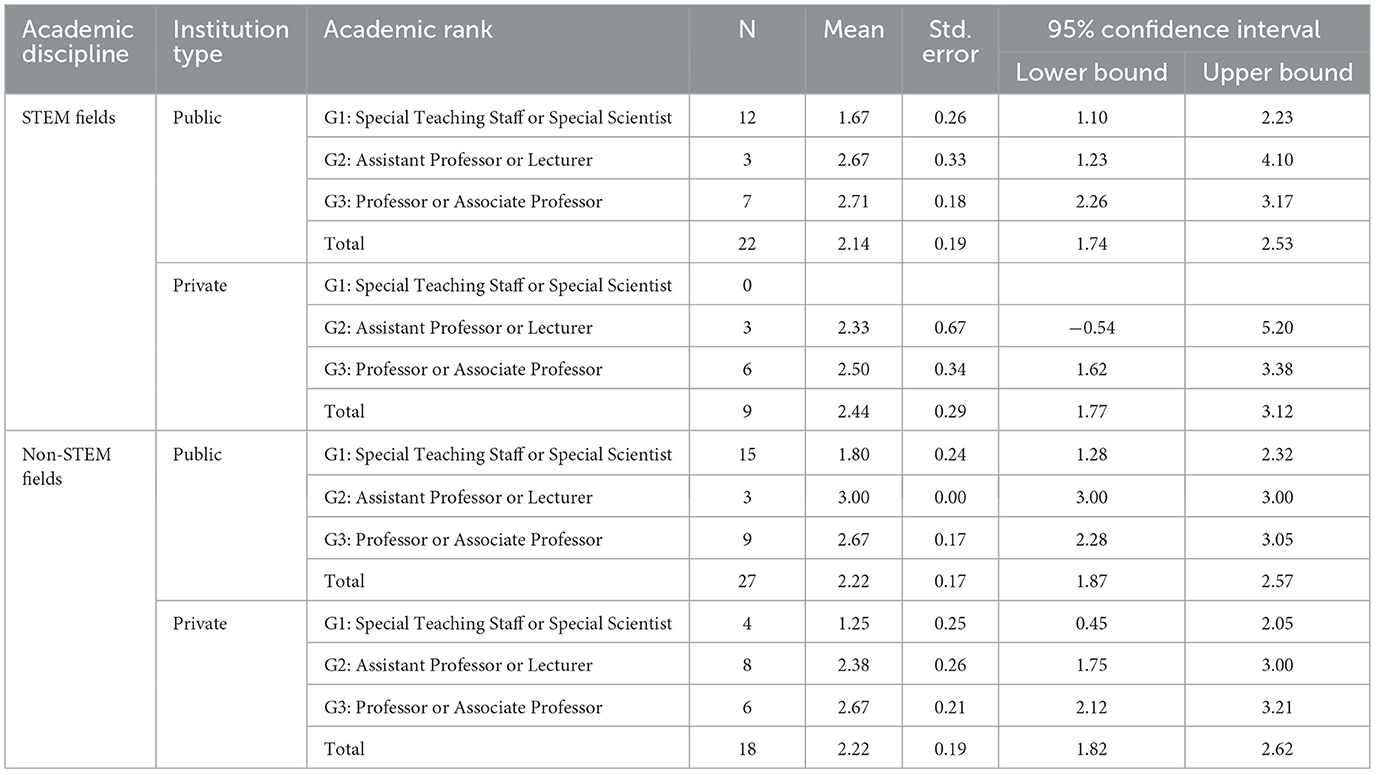
Table 4. Descriptive statistics for the academic staff perceptions of IaH as a strategic priority in their departments between academic discipline, institution type and academic rank categories.
Table 4 indicates that perceptions of IaH as a strategic priority vary by discipline, institution type, and academic rank. Public institutions reported lower overall means (STEM: M = 2.14, non-STEM: M = 2.22), with Group 3 in both disciplines showing stronger agreement (STEM: M = 2.71, non-STEM: M = 2.67). In private institutions, Group 2 and Group 3 had similar positive responses (M = 2.44 in STEM, M = 2.22 in non-STEM). Group 1 consistently reported the lowest agreement, especially in private non-STEM fields (M = 1.25).
A three-way ANOVA revealed a significant main effect of academic rank on academic staff perceptions of IaH as a strategic priority within their departments, F(2, 65) = 12.434, p < 0.001, = 0.28 (Figure 2). Pairwise comparisons indicated that the mean perceptions of IaH as a strategic priority were significantly lower among Group 1 compared to both Group 2 (p < 0.05) and Group 3 (p < 0.001). No significant difference was observed between groups 2 and 3 (p = 0.862). As previously observed, there was no significant effect of academic discipline on academic staff perceptions of IaH as a strategic priority, F(1, 65) = 0.375, p = 0.543, = 0.01, indicating no difference between STEM and non-STEM fields. Similarly, institution type had no significant effect, F(1, 65) = 2.539, p = 0.116, = 0.04, with perceptions comparable between public and private institutions.
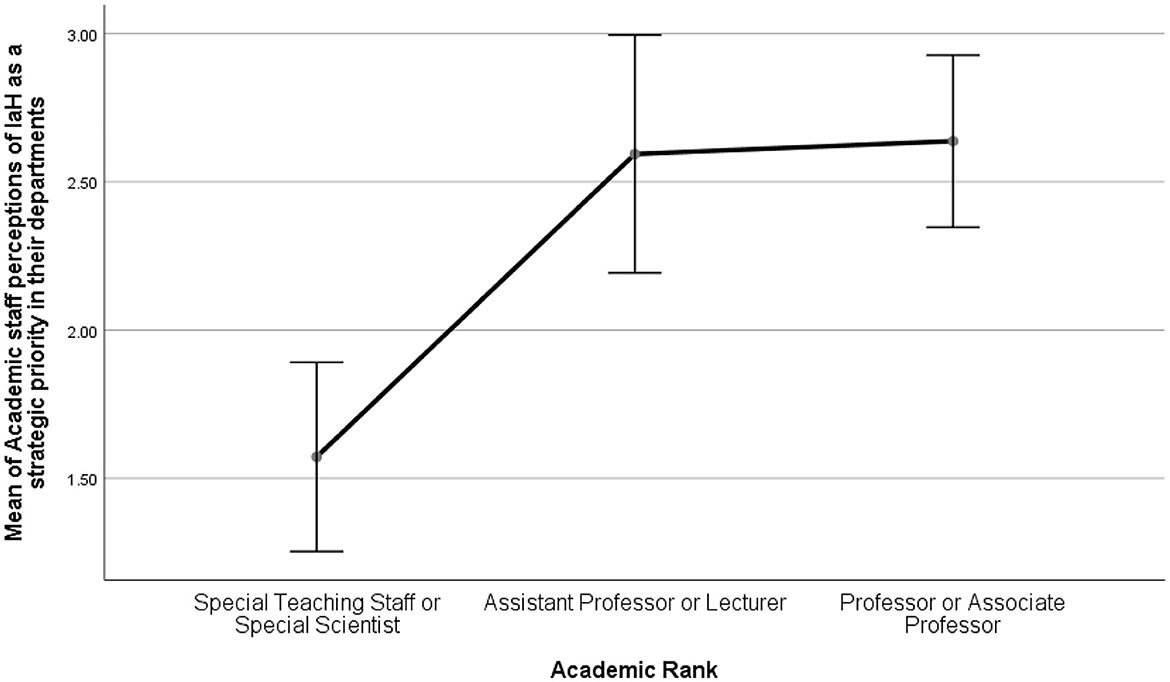
Figure 2. Mean plots with 95% confidence intervals error bars of the academic staff perceptions of IaH as a strategic priority in their departments between academic rank categories.
6.1.3 Academic staff perceptions of challenges to advancing IaH in their departments
Descriptive statistics illustrating academic staff perceptions of the challenges to advancing IaH in their departments are presented in Table 5.
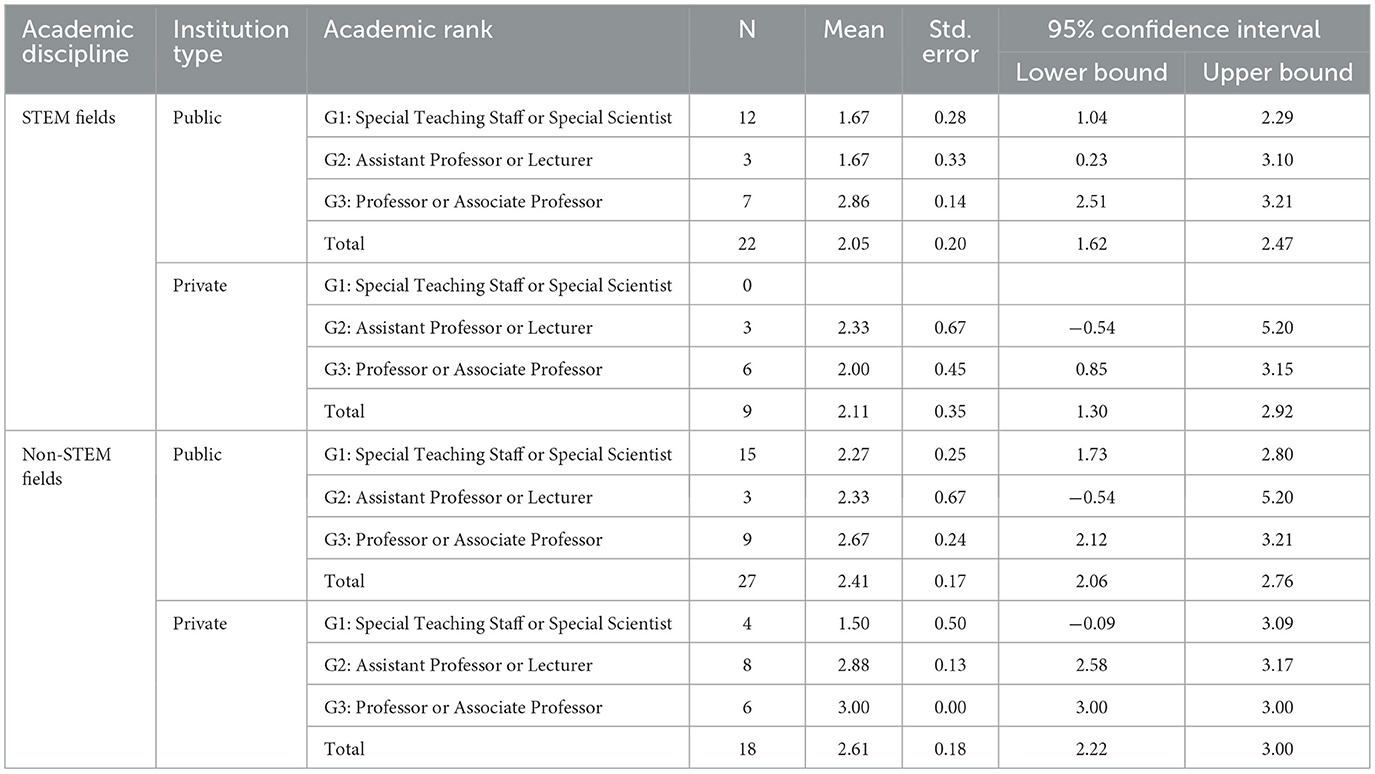
Table 5. Descriptive statistics for the academic staff perceptions of challenges to advancing IaH in their departments between academic discipline, institution type and academic rank categories.
Table 5 highlights variations in perceptions of challenges to advancing IaH. Public universities- STEM fields reported moderate agreement overall (M = 2.05), with Group 3 expressing the strongest concerns (M = 2.86). In private universities STEM fields, responses were similar (M = 2.11), led by Group 2 (M = 2.33). Non-STEM fields showed higher agreement overall, especially in private universities (M = 2.61), where Group 3 consistently identified challenges (M = 3.00). Public universities non-STEM fields reported slightly lower means (M = 2.41), with Group 3 expressing stronger concerns (M = 2.67).
A three-way ANOVA identified a significant main effect of academic discipline on academic staff perceptions of challenges in advancing IaH within their departments, F(1, 65) = 6.911, p < 0.05, = 0.10 (Figure 3). Pairwise comparisons indicated that perceptions of challenges were significantly lower for STEM fields compared to non-STEM fields (p < 0.05). Similarly, a significant main effect of academic rank was observed on academic staff perceptions of challenges in advancing IaH within their departments, F(2, 65) = 7.365, p < 0.01, = 0.19 (Figure 4). Pairwise comparisons showed that perceptions of challenges were significantly lower for Group 1 compared to Group 3 (p < 0.01). No significant differences were found between Group 2 and Group 3 (p = 0.228) or between Group 2 and Group 1 (p = 0.084). There was no significant effect of Institution type on academic staff perceptions of challenges to advancing IaH, F(1, 65) = 0.226, p = 0.636, = 0.00.
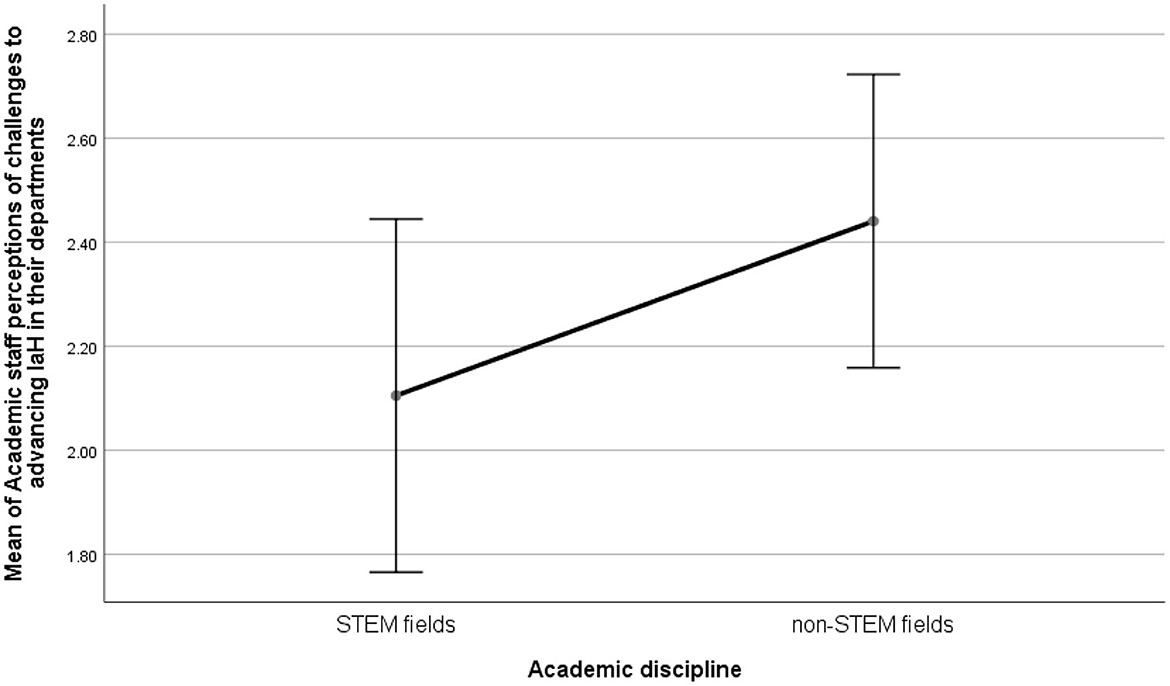
Figure 3. Mean plots with 95% confidence intervals error bars of academic staff perceptions of challenges to advancing IaH in their departments between academic discipline categories.
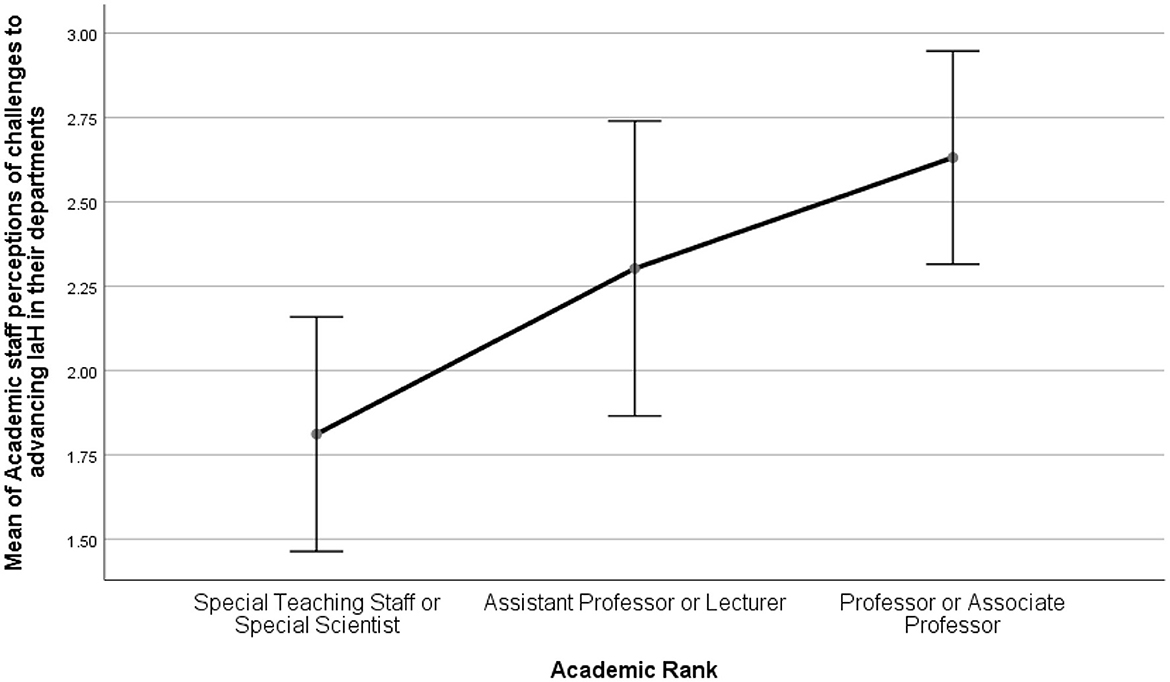
Figure 4. Mean plots with 95% confidence intervals error bars of academic staff perceptions of challenges to advancing IaH in their departments between academic rank categories.
Given the importance of identifying potential challenges in the implementation of IaH, the study sought to explore the types of obstacles perceived by academic staff within their departments. To this end, a list of eight options was provided, and participants were asked to select up to three. Figure 5 displays the results.
The analysis of challenges perceived by academic staff in implementing IaH reveals notable differences across groups. Group 1 identifies the limited expertise of academic personnel (63.20%) as the most prominent challenge, alongside the absence of training (46.20%) and a lack of institutional policies encouraging IaH (45.20%), highlighting the need for professional development and structural support. In contrast, Group 2 reports challenges with limited student interest (32.40%) and inflexible curricula (28.00%) as more prevalent, with less emphasis on faculty or institutional barriers. Group 3 underscores the lack of faculty support (47.60%), inflexible curricula (40.00%), and insufficient financial resources (39.60%) as key obstacles, suggesting structural impediments within institutions. These findings indicate that while some challenges are shared, others vary significantly by group, reflecting diverse institutional and contextual needs that must be addressed to advance IaH initiatives effectively.
Taking these challenges into account, the focus shifted to determining the extent to which academic staff actively integrate IaH initiatives into their teaching.
6.1.4 Implementation of IaH practices in the classroom
When asked about their engagement with IaH practices, 68.4% (N = 52) of respondents indicated that they do incorporate such practices into their teaching, while 31.6% (N = 24) reported that they do not. This suggests that the academic staff who participated in this study are, to some extent, proactive in integrating IaH initiatives, although a significant proportion still refrains from doing so. Table 6 presents descriptive statistics on the implementation of IaH practices in the classroom.
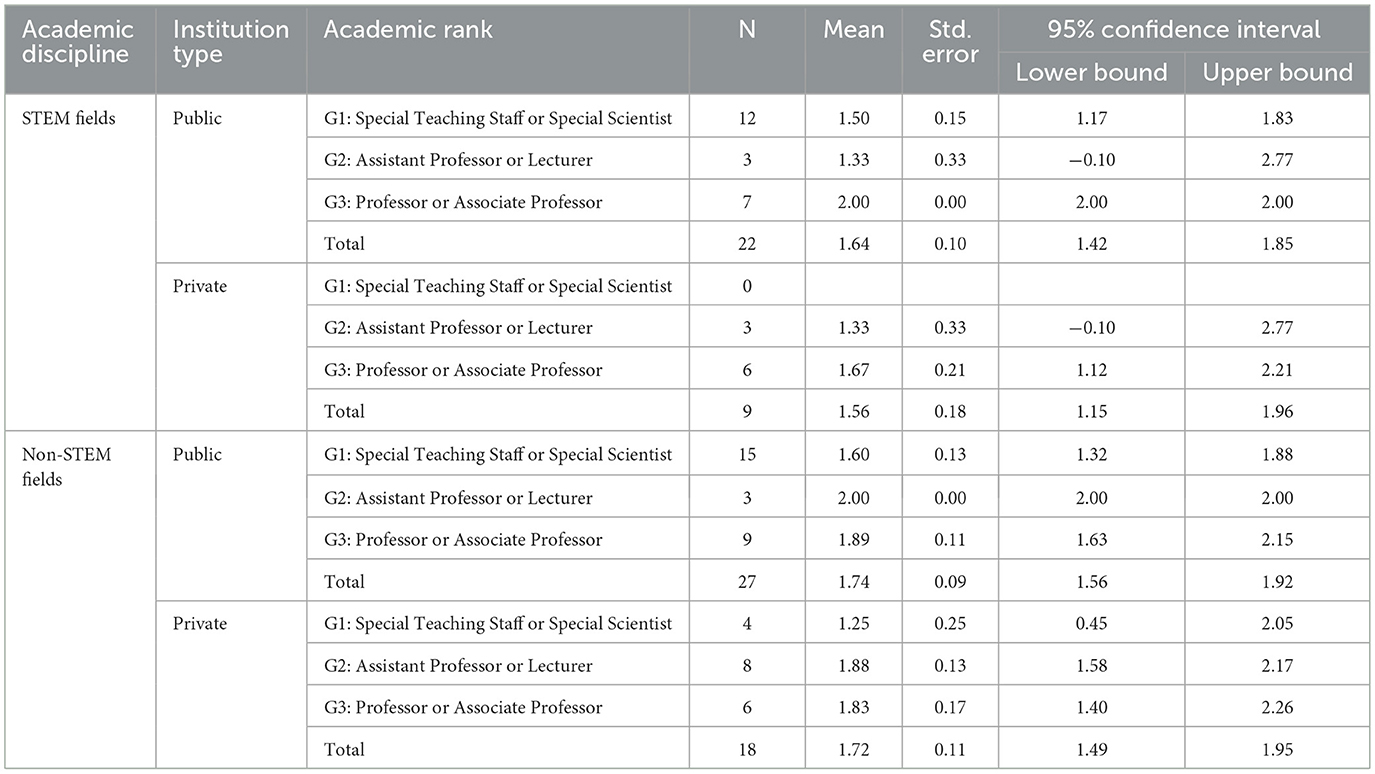
Table 6. Descriptive statistics for the Implementation of IaH practices in the classroom between academic discipline, institution type and academic rank categories.
Table 6 reveals moderate implementation of IaH practices in classrooms, with higher engagement in non-STEM fields (public: M = 1.74; private: M = 1.72) compared to STEM fields (public: M = 1.64; private: M = 1.56). Group 3 consistently reported greater implementation, particularly in public STEM (M = 2.00) and public non-STEM (M = 1.89). Group 1 reported the lowest engagement, especially in private non-STEM fields (M = 1.25).
Finally, a three-way ANOVA was also conducted to examine the effect of academic discipline, type of institution, and academic rank on the implementation of IaH practices in the classroom. The analysis revealed significant main effects for academic discipline (F(1, 65) = 5.242, p = 0.025, = 0.075) and academic rank (F(2, 65) = 5.750, p = 0.005, = 0.150), indicating that non-STEM fields and Group 3 reported higher levels of IaH implementation (Figures 6, 7). Pairwise comparisons for academic rank revealed that Group 3 reported significantly higher levels of IaH implementation compared to Group 1. However, no significant differences were found between Group 1 and Group 2 (p = 0.219) or between Group 2 and Group 3 (p = 0.146). These findings highlight the significant role of the highest rank (Group 3) in implementing IaH practices, while differences among other ranks were not statistically significant.
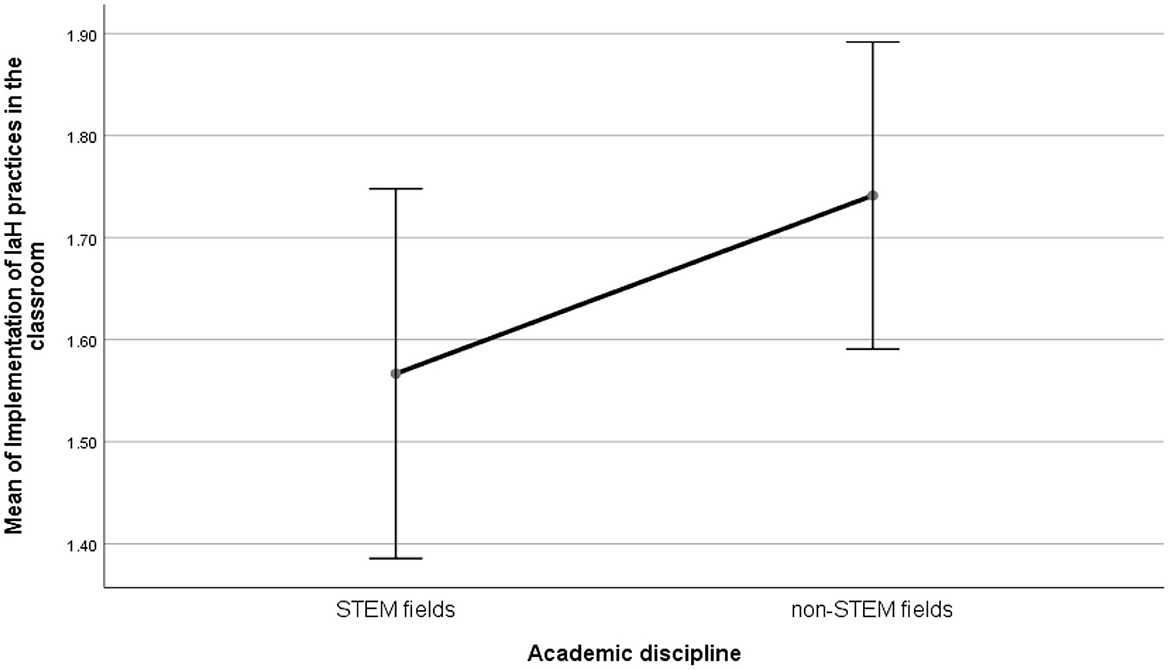
Figure 6. Mean plots with 95% confidence intervals error bars of implementation of IaH practices between academic discipline categories.
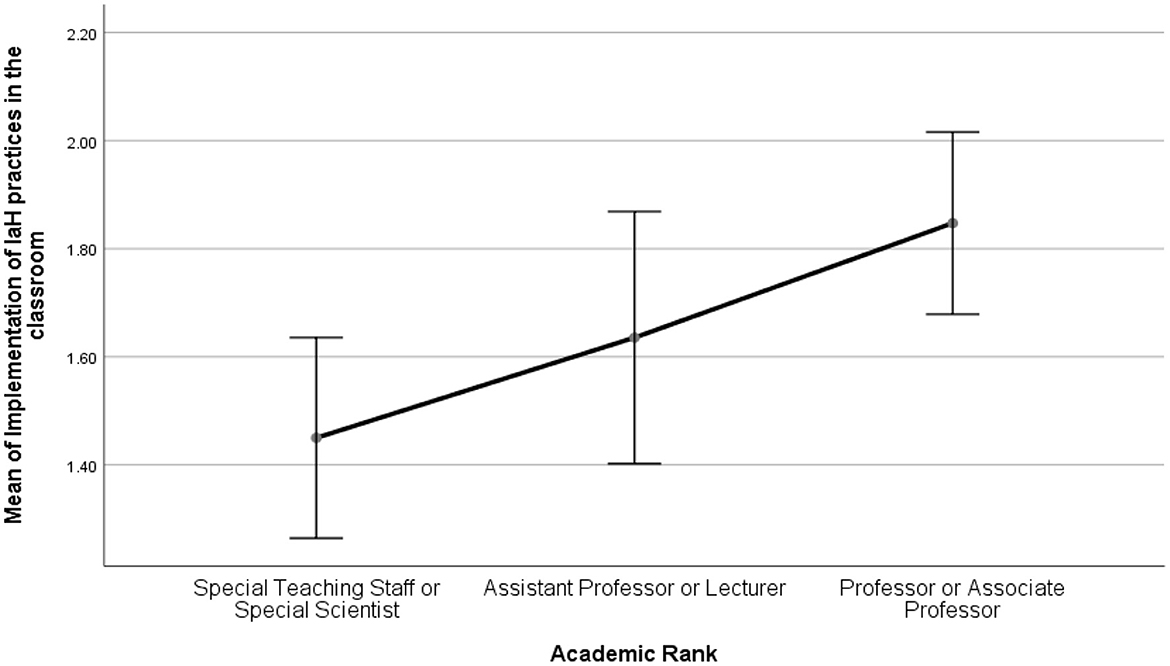
Figure 7. Mean plots with 95% confidence intervals error bars of implementation of IaH practices academic discipline categories.
6.2 Activities implemented by academic staff to promote IaH in their classes
The second research question of this study investigated the activities academic staff employ to promote IaH practices in their classes. The reported results correspond to the 52 participants who indicated using IaH activities in their classes. The QCA of the open-ended responses resulted in nine main codes, which were derived inductively from the data. Table 7 provides an overview of the nine codes, including their descriptions, representative examples, and frequencies.
As significant differences were observed in participants' academic disciplines and ranks regarding IaH implementation, the analysis further investigated whether differences existed in the types of IaH practices reported by participants. Figures 8, 9 illustrate the distribution of these reported practices, classified according to the nine codes (Table 7).
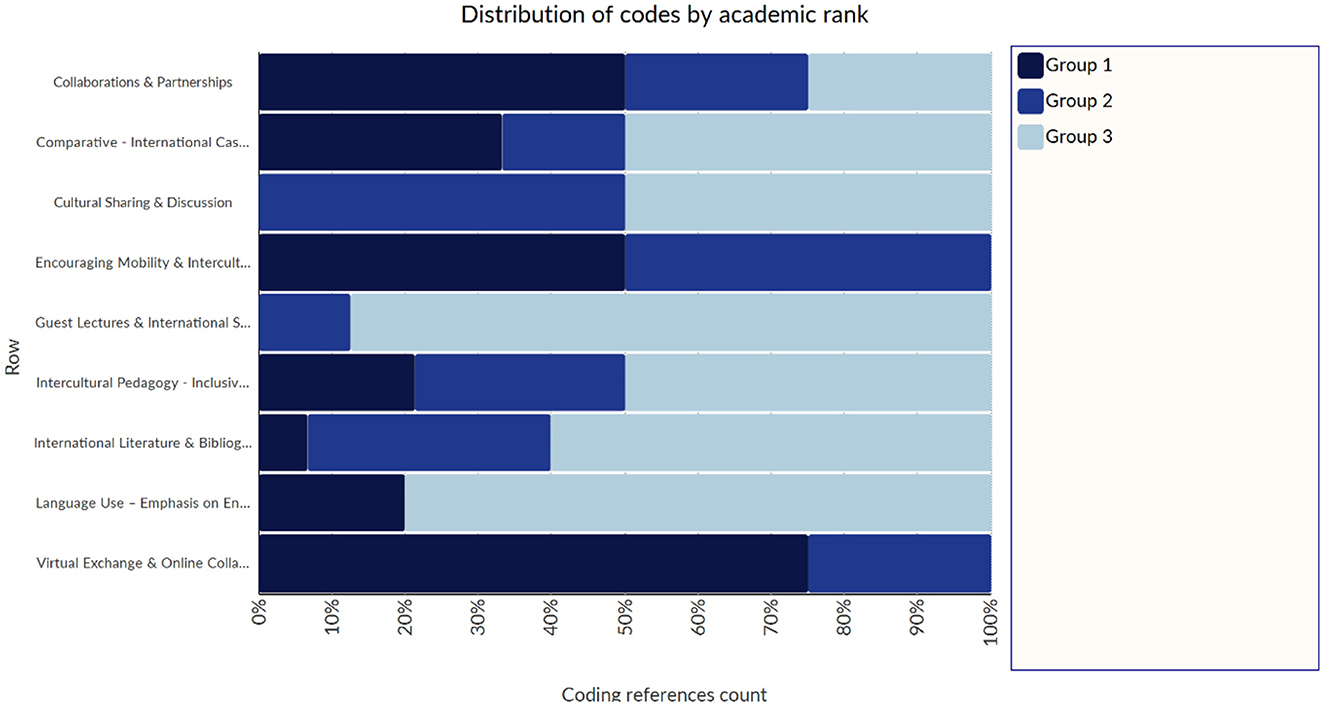
Figure 9. Reported IaH practices by academic rank (Group 1: Special Scientists or Special Teaching Staff, Group 2: Lecturer or Assistant Professor, Group 3: Associate Professor or Professor).
Analysis of code distributions by academic field (Figure 8) indicates that most IaH practices were more prominent among non-STEM than STEM disciplines, particularly “Encouraging Mobility and Intercultural Competence” and “Virtual Exchange and Online Collaboration”, which appeared exclusively in non-STEM (100% vs. 0%). “Comparative—International Case Studies and Cultural Sharing and Discussion” were also heavily concentrated in non-STEM fields (89.19% and 80.15%, respectively). In contrast, “Language Use—Emphasis on English” stood out as the only practice more prevalent in STEM than non-STEM (60.32% vs. 39.68%). For codes such as “Collaborations and Partnerships”, “Guest Lectures and International Speakers”, “Intercultural Pedagogy – Inclusive Teaching”, and “International Literature and Bibliography”, the distribution between non-STEM and STEM was more balanced, though still favoring non-STEM. These findings suggest that while certain IaH practices are widely adopted across disciplines, others appear strongly aligned with either non-STEM or STEM contexts.
Finally, when the results are analyzed from the perspective of academic rank, distinct patterns emerge. “Collaborations and Partnerships are most prominent” in Group 1 (48.48%), followed by Group 2 (33.33%) and Group 3 (18.18%). “Comparative—International Case Studies” are most frequently reported by Group 1 (47.30%) and Group 3 (37.84%), with a smaller percentage from Group 2 (14.86%). “Cultural Sharing and Discussion” is predominantly associated with Group 2 (62.50%) and Group 3 (37.50%), with no representation from Group 1 (0%). “Encouraging Mobility and Intercultural Competence” is reported exclusively by Group 1 (61.67%) and Group 2 (38.33%), with no contributions from Group 3 (0%). “Guest Lectures and International Speakers” are overwhelmingly represented in Group 3 (92.37%), with minimal reporting from Group 2 (7.63%) and none from Group 1 (0%). “Intercultural Pedagogy—Inclusive Teaching” is more prevalent in Group 3 (44.11%) than in Group 1 (33.15%) or Group 2 (22.74%). “International Literature and Bibliography” is most commonly reported by Group 3 (61.15%), followed by Group 2 (27.31%) and Group 1 (11.54%). “Language Use—Emphasis on English” shows the highest frequency in Group 3 (80.95%), with smaller contributions from Group 1 (19.05%) and none from Group 2 (0%). Lastly, “Virtual Exchange and Online Collaboration” is nearly evenly split between Group 1 (48.91%) and Group 2 (51.09%), with no reporting from Group 3 (0%). These findings highlight again the variation in IaH practices across academic ranks.
7 Discussion
The results of this study indicate that, in the six universities explored in the Republic of Cyprus, IaH is implemented through a variety of activities, including formal curriculum (Leask, 2015), campus-based initiatives (Jones, 2017; Hofmeyr, 2021), and Virtual Exchange (O'Dowd, 2023). However, the extent and nature of this implementation are shaped by multiple factors to varying degrees. Previous research has pointed to academic rank as a potential factor in IaH implementation (Stohl, 2007), and our study reinforces this view: academic rank emerged as a significant variable shaping how faculty perceive the importance of IaH. Senior academics—particularly Associate and Full Professors (Group 3)—tended to express stronger support for IaH compared to Special Teaching Staff or Special Scientists (Group 1). This hierarchy in perception may reflect underlying differences in institutional power, access to professional networks, and opportunities for career development, all of which can shape an individual's engagement with IaH initiatives. Childress' (2018) “5 I's” model could serve as a guiding framework for enhancing support for less senior staff.
Perceptions of challenges also varied notably by academic rank. Special Teaching Staff and Special Scientists highlighted a lack of expertise and training, particularly in adapting to new teaching methods associated with online and virtual internationalization, as a key obstacle (Marinoni and Pina Cardona, 2024). Lecturers and Assistant Professors (Group 2) were more likely to mention limited student interest, also noted by Weimer et al. (2019) in Finnish HE institutions, as well as inflexible curricula. In contrast, Associate and Full Professors pointed to broader institutional barriers, such as insufficient funding and limited faculty support (Marinoni and Pina Cardona, 2024). These differences suggest that academic rank influences not only how IaH is perceived but also the kinds of challenges that might be encountered in practice.
Contrary to expectations, this study found that neither academic discipline nor institution type had a statistically significant effect on how faculty assessed the overall importance or strategic priority of IaH. This may suggest that systemic or cultural factors, such as national policies, shared academic values, or sector-wide professional development practices, play a more substantial role than structural differences alone in shaping faculty attitudes (Marinoni and Pina Cardona, 2024). However, discipline did emerge as a relevant factor when looking more closely at perceived challenges. Faculty in non-STEM fields reported greater difficulties in advancing IaH, reinforcing earlier observations that implementation varies across disciplines (Eftekhari et al., 2025), and aligning with Helm and Beaven's (2020) documentation of underrepresentation and specific challenges in fields such as the arts, tourism, and humanities. These findings point to the need for discipline-sensitive approaches that consider curriculum constraints, pedagogical traditions, and resourcing differences.
The lack of variation between public and private institutions is also noteworthy. While previous research has suggested that institution type may influence IaH rationales—such as employability and market responsiveness in private HE institutions (Chanda and Betai, 2022) vs. more cultural or academic motivations in public HE institutions (Svetlik and Braček Lalić, 2014)—our results indicate that these differing rationales may not significantly affect faculty perceptions at the implementation level. This implies that broader, sector-wide challenges may overshadow institutional distinctions, supporting Tamrat's (2020) argument that both public and private institutions face structural and regulatory barriers that can limit the reach of IaH initiatives.
Despite the challenges identified, nearly 70% of respondents reported integrating IaH into their teaching practices. Consistent with the quantitative findings, rank-based variation also emerged in the types of IaH practices reported. “Guest Lectures and International Speakers” were reported almost exclusively by senior faculty (Group 3), whereas Virtual Exchange and Online Collaboration were more commonly mentioned by lower- and medium ranked academic staff (Group 1 and Group 2). These patterns suggest that role-specific responsibilities and access to institutional resources may influence which forms of IaH are feasible or prioritized by staff at different career stages. This reinforces previous calls for differentiated support structures that account for the varied constraints and motivations across academic ranks (Clifford and Montgomery, 2017).
While the quantitative analysis revealed no statistically significant differences in how the importance of IaH is perceived across academic disciplines, qualitative findings point to clear disciplinary variation in its implementation (Eftekhari et al., 2025; Helm and Beaven, 2020). This aligns with observations by Mittelmeier et al. (2024), who argue that disciplines adopt distinct rationales and strategies for internationalization based on their underlying epistemologies. In our study, academic staff from non-STEM fields more frequently reported using practices, such as “Comparative International Case Studies, Cultural Sharing and Discussion, and Intercultural Pedagogy”, approaches commonly associated with the humanities and social sciences, where culturally situated learning and diverse perspectives are emphasized (Jones and Killick, 2007; Leask, 2009).
In contrast, consistent with Weimer et al.'s (2019) findings, academic staff in STEM disciplines frequently cited “Language Use,” typically linked to English-medium instruction, as their primary form of IaH practice. This reflects a more instrumental model of internationalization (Wächter and Maiworm, 2014), which remains somewhat disconnected from emerging efforts to decolonize IaH practices (Wimpenny et al., 2021). This trend resonates with current debates in Cyprus, where the introduction of English-medium undergraduate programs in public universities is often equated with internationalization (AACRAO, 2024; Philenews, 2025). The following excerpt portrays this situation:
“Due to our legal restriction to have undergrad courses only in Greek our only way of diversifying our undergraduate student body is through foreign student who live in Cyprus and have gone through the Greek speaking elementary and/or high school system” (P16, Engineering Design, Public University, Professor).
The participant's comment exposes the practical tensions between national language policies, equity in access, and the aspirations to internationalize HE (Emilianides and Hadjisoteriou, 2020; Klerides and Philippou, 2015). Finally, the scarcity of Virtual Exchange and Intercultural Competence activities reported in STEM fields reflects the same absence in the documents analyzed from the six universities (cf. Table 1) and further supports earlier discussions that internationalization in these domains often manifests as global research collaboration or language policy rather than student-centered pedagogical practices (Leask, 2009). These results underscore the importance of tailoring IaH strategies not only to academic rank but also to disciplinary context, recognizing that different fields operate under distinct teaching traditions, curricular structures, and internationalization logics.
7.1 Limitations
This study's findings should be interpreted with certain considerations in mind. First, the sample was drawn solely from six Cypriot HE institutions, which may limit the generalizability of the results to other cultural or institutional contexts. Second, the relatively modest sample size and the reliance on self-reported perceptions introduce the possibility of response bias, particularly if those more engaged in IaH were more inclined to participate. Third, without direct classroom observation, the extent to which reported perceptions and IaH activities actually occur in practice remains unverified. Finally, while the study examined key variables (academic discipline, institution type, and rank), other factors, such as individual motivation, institutional resources, or leadership support, were not explored in depth and could further influence IaH implementation.
8 Conclusion
This study highlights the complex interplay of academic rank, disciplinary context, and structural constraints in shaping how IaH is perceived and practiced by academic staff in Cyprus. While institution type appeared to have limited influence, academic rank emerged as a key factor in determining both faculty attitudes and the types of IaH activities adopted. Disciplinary context also influenced the forms that IaH takes in practice. Although no statistically significant differences were found in how faculty across disciplines perceive the importance of IaH, qualitative findings revealed meaningful variation in implementation. Academic staff in non-STEM fields reported a wider range of culturally embedded practices, such as intercultural pedagogy and international case studies, while those in STEM disciplines were more likely to rely on an interpretation of IaH linked to English-language instruction, a model that remains largely disconnected from decolonizing approaches to internationalization. This resonates with current debates in Cyprus, where the push for English-medium undergraduate programs in public universities is often equated with internationalization. Despite these tensions, the widespread adoption of diverse IaH strategies by academic staff, regardless of institutional type, demonstrates both a commitment to global engagement and the adaptability of faculty working within varying constraints. Moving forward, efforts to enhance IaH in Cyprus must be grounded in policies that recognize the differentiated needs of academic staff across ranks and disciplines. Stakeholders, from university leadership to national policy makers, must ensure that support for IaH includes professional development, curricular flexibility, and inclusive language policies. Only by addressing these contextual factors can IaH become a truly integrated and transformative element of HE in Cyprus.
Data availability statement
The datasets presented in this article are not readily available due to confidentiality agreements with participants. It contains potentially identifiable information from academic staff at higher education institutions in Cyprus. Access is therefore restricted to protect participants' anonymity and comply with ethical research standards by the Cyprus National Bioethical Committee. Requests to access the datasets should be directed to c291bGUubWFyaWEtdmljdG9yaWFAdWN5LmFjLmN5.
Ethics statement
This study involved human participants. The study design was approved by the Cyprus National Bioethics Committee. All participants provided written informed consent to take part in the study.
Author contributions
MS: Conceptualization, Data curation, Formal analysis, Investigation, Methodology, Resources, Visualization, Writing – original draft, Writing – review & editing.
Funding
The author(s) declare that financial support was received for the research and/or publication of this article. This study was partially funded by the Cyprus University of Technology Postdoctoral Research Excellence Innovation Programme (METADIDAKTOR).
Conflict of interest
The author declares that the research was conducted in the absence of any commercial or financial relationships that could be construed as a potential conflict of interest.
Generative AI statement
The author(s) declare that no Gen AI was used in the creation of this manuscript.
Any alternative text (alt text) provided alongside figures in this article has been generated by Frontiers with the support of artificial intelligence and reasonable efforts have been made to ensure accuracy, including review by the authors wherever possible. If you identify any issues, please contact us.
Publisher's note
All claims expressed in this article are solely those of the authors and do not necessarily represent those of their affiliated organizations, or those of the publisher, the editors and the reviewers. Any product that may be evaluated in this article, or claim that may be made by its manufacturer, is not guaranteed or endorsed by the publisher.
Footnotes
1. ^To ensure confidentiality, the names of the institutions are not disclosed. The abbreviation “U” indicates “University.”
2. ^The classification of academic rank reflects academic roles within the Cypriot HE system: Group 1 focused primarily on teaching, with no formal research obligations; this group included permanent and non-permanent staff who may hold a PhD and engage in research, although they are not required to do so. Group 2 comprised non-tenured academics at an early stage of their career (defined by career stage rather than age), who carried teaching, research, and administrative responsibilities. Group 3 consisted of tenured faculty, who likewise combined teaching, research, and administrative responsibilities but within permanent positions.
References
AACRAO (2024). Cyprus Education Minister Mulls English-Language Undergrad Degrees at Public Universities. American Association of Collegiate Registrars and Admissions Officers. Available online at: https://www.aacrao.org/edge/emergent-news/cyprus-education-minister-mulls-english-language-undergrad-degrees-at-public-unis (Accessed August 28, 2025).
Almeida, J., Robson, S., Morosini, M., and Baranzeli, C. (2018). Understanding internationalization at home: perspectives from the global North and South. Eur. Educ. Res. J. 18, 200–217. doi: 10.1177/1474904118807537
Barbosa, B., Santos, C., and Prado-Meza, C. M. (2020). There is no one way to internationalization at home: virtual mobility and student engagement through formal and informal approaches to curricula. Revista Lusófona de Educação 47, 85–98. doi: 10.24140/issn.1645-7250.rle47.06
Beelen, J., and Jones, E. (2015). “Redefining internationalization at home,” in The European Higher Education Area: Between Critical Reflections and Future Policies, eds. A. Curai, L. Matei, R. Pricopie, J. Salmi, and P. Scott (Springer), 59–72.
Chanda, R., and Betai, N. (2022). “Internationalisation and private higher education institutions,” in India Higher Education Report 2021: Private Higher Education, eds. N. V. Varghese and J. Panigrahi (New Delhi: Routledge), 33–55.
Childress, L. (2018). The twenty-first century university: Developing faculty engagement in internationalization. Bern: Peter Lang.
Clifford, V., and Montgomery, C. (2017). Designing an internationalised curriculum for higher education: embracing the local and the global citizen. High. Educ. Res. Dev. 36, 1138–1151. doi: 10.1080/07294360.2017.1296413
Cunningham, H., Topping, K., and Levy, S. (2024). Higher education internationalisation policy and home student populations. Comp. J. Comp. Int. Educ. 54, 1–18. doi: 10.1080/03057925.2023.2292532
CYQAA (2015). Law 136(I)/2015: Establishment of the Cyprus Agency of Quality Assurance and Accreditation in Higher Education. Available online at: https://www.dipae.ac.cy/index.php/en/cyqaa-en/law-en (Accessed August 25, 2025).
de Wit, H. (2024). “Everything that quacks is internationalization”—critical reflections on the evolution of higher education internationalization. J. Stud. Int. Educ. 28, 3–14. doi: 10.1177/10283153231221655
Eftekhari, P., Yousefzadeh, S., and Coelen, R. J. (2025). Internationalization of the curriculum at home (IoCaH): why academic disciplines matter. J. Stud. Int. Educ. 23:10283153241307967. doi: 10.1177/10283153241307967
Emilianides, A., and Hadjisoteriou, C. (2020). “Cyprus,” in Balancing Freedom, Autonomy and Accountability in Education, eds. J. deGroof and C. Glenn (Baltimore, MA: John Hopkins School of Education and European Association for Education Law and Policy), 1–25.
ENQA (2018). Annex I: Terms of Reference - ENQA-Coordinated Review of CYQAA. Available online at: https://www.enqa.eu/wp-content/uploads/Annex_I_Terms_of_Reference_ENQA_coordinated_review-of-CYQAA.pdf (Accessed August 1, 2025).
European Commission Directorate General for Education, Youth, Sport and Culture. (2024). Education and Training Monitor 2024 - Cyprus. Publications Office of the European Union. Available online at: https://data.europa.eu/doi/10.2766/16539 (Accessed August 1, 2025).
Eurydice (2025). Quality Assurance in Higher Education - Cyprus. European Commission. Available online at: https://eurydice.eacea.ec.europa.eu/eurypedia/cyprus/quality-assurance-higher-education (Accessed July 31, 2025).
Ferencz, I., and Rumbley, L. E. (2022). Europe's post-pandemic internationalisation: challenges and possibilities in a decidedly networked future. High. Educ. Q. 76, 551–566. doi: 10.1111/hequ.12381
Helm, F., and Beaven, A., (eds.). (2020). Designing and Implementing Virtual Exchange: A Collection of Case Studies. Voillans: Research-Publishing. doi: 10.14705/rpnet.2020.45.9782490057726
Hofmeyr, A. S. (2021). Taking advantage of a multicultural campus: impact of at-home intercultural initiatives on Japanese students' skills and future goals. J. Stud. Int. Educ. 25, 182–202. doi: 10.1177/1028315320906159
Hudzik, J. (2015). Comprehensive Internationalization: Institutional Pathways to Success. London: Routledge.
Janebová, E., and Johnstone, C. (2022). “Mapping inclusive internationalization,” in Inequalities In Study Abroad and Student Mobility, eds. S. Kommers and K. Bista (London: Routledge), 115–128.
Jones, E. (2017). “Internationalisation of the curriculum: challenges, misconceptions and the role of disciplines,” in Internationalisierung der Curricula an Hochschulen: Konzepte, Initiativen, Maßnahmen, eds. H. Casper-Hehne and T. Reiffenrath (Bielefeld: W. Bertelsmann Verlag), 21–39.
Jones, E., and Killick, D. (2007). “Internationalisation of the curriculum,” in Internationalising Higher Education, eds. E. Jones and S. Brown (London: Routledge), 109–119.
Klerides, E., and Philippou, S. (2015). “Cyprus: exploring educational reform 2004–2014,” in Education in the European Union: Post-2003 Member States, eds. D. Florian, M. Simons, and M. A. Peters (London: Bloomsbury Academic), 51–74.
Knight, J. (2012). Student mobility and internationalization: trends and tribulations. Res. Comp. Int. Edu. 7, 20–33. doi: 10.2304/rcie.2012.7.1.20
Kreber, C. (2009). Different approaches to internationalization in higher education: implications for curriculum studies. J. Curric. Stud. 41, 159–180. doi: 10.1002/tl.348
Leask, B. (2009). Using formal and informal curricula to improve interactions between home and international students. J. Stud. Int. Educ. 13, 205–221. doi: 10.1177/1028315308329786
Li, J., and Xue, E. (2022). Exploring the epistemology of internationalization at home: a scoping review approach. Educ. Philos. Theor. 55, 356–365. doi: 10.1080/00131857.2021.2022473
Li, J., and Xue, E. (2023). Stakeholders' perspectives on implementing “internationalization at home” for China's international education sustainability: challenges and strategies. Sustainability 15:247. doi: 10.3390/su15010247
Lomer, S., and Anthony-Okeke, L. (2019). Ethically engaging international students: student generated material in an active blended learning model. Teach. High. Educ. 24, 613–632. doi: 10.1080/13562517.2019.1617264
Marinoni, G., and Pina Cardona, S. B. (2024). Internationalization of Higher Education: Current Trends and Future Scenarios (6th IAU Global Survey Report). International Association of Universities. Available online at: https://www.iau-aiu.net/IMG/pdf/2024_internationalization_survey_report_digital.pdf (Accessed February 20, 2024).
Ministry of Education Sport and Youth. (2024). Higher Education Strategy of Cyprus. Available online at: https://www.highereducation.ac.cy/index.php/en (Accessed August 28, 2025).
Mittelmeier, J., Lomer, S., Al-Furqani, S., and Huang, D. (2024). Developing meaningful internationalisation that impacts students' outcomes in higher education: a scoping review of the literature 2011–2022. J. Stud. Int. Educ. 0, 1–23. doi: 10.1177/10283153231222278
Nicolaou, A., and Sevilla-Pavón, A. (2016). “Exploring telecollaboration through the lens of university students: a Spanish-Cypriot telecollaborative exchange,” in New Directions in Telecollaborative Research and Practice: Selected Papers from the Second Conference on Telecollaboration in Higher Education, eds. S. Jager, M. Kurek, and B. O'Rourke (Dublin: Research-publishing.net), 113–119.
Nilsson, B. (2003). Internationalisation at home from a Swedish perspective: the case of Malmö. J. Stud. Int. Educ. 7, 27–40. doi: 10.1177/1028315302250178
O'Dowd, R. (2023). Internationalising Higher Education and the Role of Virtual Exchange. London: Routledge.
O'Dowd, R., and Beelen, J. (2021). Virtual exchange and internationalisation at home: Navigating the terminology. EAIE Blog. Available online at: https://www.eaie.org/blog/virtual-exchange-iah-terminology.html (Accessed February 1, 2024).
Ogden, A. C., Streitwieser, B., and Mol, C. V. (2020). Education Abroad: Bridging Scholarship and Practice. London: Routledge.
Philenews (2025). Parliament Divided Over English-Language Degrees at Public Universities. Available online at: https://in-cyprus.philenews.com/local/cyprus-parliament-debate-english-degrees-state-universities/ (Accessed August 28, 2025).
Plews, J. L. (2007). “Internationalization begins at home: Domestic collaboration for international second language teacher education,” in Voice and Vision in Language Teacher Education (Ottawa: ESL Canada Publications).
Pop, L., Morales, L., Peev, I., Soulé, M. V., Coetzer, J., Gilani, H., et al. (2024). “Inclusivity and diversity: marketing exercise or a real commitment?,” in Decolonizing Marketing Theory and Practice: Beyond Inclusivity and Sustainability Debates, ed. H. Gilani (London: Routledge), 114–136.
Psychouli, P., Collins, K., and Zadnik, M. (2020). Internationalization at home: an occupational therapy synchronous collaboration between Cyprus and the United States. Am. J. Occup. Ther. 74, 1–9. doi: 10.5014/ajot.2020.037440
Robson, S., Almeida, J., and Schartner, B. (2018). Internationalization at home: time for review and development? Eur. J. High. Educ. 8, 19–35. doi: 10.1080/21568235.2017.1376697
Seeber, M., Meoli, M., and Cattaneo, M. (2020). How do European higher education institutions internationalize? Stud. High. Educ. 45, 145–162. doi: 10.1080/03075079.2018.1541449
Selvi, A. F. (2020). “Qualitative content analysis,” in The Routledge Handbook of Research Methods in Applied Linguistics, eds. J. McKinley and H. Rose (London: Routledge), 440–453.
Sevilla-Pavón, A., and Nicolaou, A. (2020). Artefact co-construction in virtual exchange: “Youth entrepreneurship for society.” Comput. Assist. Lang. Learn. 35, 1329–1353. doi: 10.1080/09588221.2020.1825096
Sierra-Huedo, M. L., Bruton, L., and Fernández, C. (2024). Becoming global at home: an analysis of existing cases and a proposal for the future of internationalization at home. J. Educ. 204, 241–254. doi: 10.1177/00220574221108053
Soulé, M. V., Parmaxi, A., and Nicolaou, A. (2024). Internationalization at home in higher education: a systematic review of teaching and learning practices. J. Appl. Res. High. Educ. 17, 29–60. doi: 10.1108/JARHE-10-2023-0484
Stohl, M. (2007). We have met the enemy and he is us: the role of the faculty in the internationalization of higher education in the coming decade. J. Stud. Int. Educ. 11, 359–372. doi: 10.1177/1028315307303923
Svetlik, I., and Braček Lalić, A. (2014). The impact of the internationalisation of higher education on academic staff development—The case of Slovenian public universities. Stud. High. Educ. 41, 364–380. doi: 10.1080/03075079.2014.942266
Tamrat, W. (2020). The disjuncture between private higher education and internationalisation. Int. J. Afr. High. Educ. 7:13231. doi: 10.6017/ijahe.v7i2.13231
UNESCO Institute for Statistics (2014). ISCED Fields of Education and Training 2013 (ISCED-F 2013): Manual to Accompany the International Standard Classification of Education 2011. UNESCO Institute for Statistics. doi: 10.15220/978-92-9189-150-4-en
Wächter, B., and Maiworm, F. (2014). English-Taught Program in European Higher Education: The State of Play in 2014. Bonn: Lemmens Medien GmbH.
Weimer, L., Hoffman, D., and Silvonen, A. (2019). Internationalization at Home in Finnish Higher Education Institutions and Research Institutes. Helsinki: Ministry of Education and Culture.
Keywords: Internationalization at Home, academic staff, teaching practices, Cypriot higher education, inclusive internationalization
Citation: Soule MV (2025) Contextualizing Internationalization at Home: academic perspectives from Cypriot higher education in a changing global landscape. Front. Educ. 10:1657401. doi: 10.3389/feduc.2025.1657401
Received: 01 July 2025; Accepted: 25 August 2025;
Published: 06 October 2025.
Edited by:
Adan Lopez-Mendoza, Universidad Autónoma de Tamaulipas, MexicoReviewed by:
Iryna Sikorska, Mariupol State University, UkraineZaruhi Soghomonyan, Fondation Universite Francaise en Armenie, Armenia
Copyright © 2025 Soule. This is an open-access article distributed under the terms of the Creative Commons Attribution License (CC BY). The use, distribution or reproduction in other forums is permitted, provided the original author(s) and the copyright owner(s) are credited and that the original publication in this journal is cited, in accordance with accepted academic practice. No use, distribution or reproduction is permitted which does not comply with these terms.
*Correspondence: Maria Victoria Soule, c291bGUubWFyaWEtdmljdG9yaWFAdWN5LmFjLmN5
 Maria Victoria Soule
Maria Victoria Soule